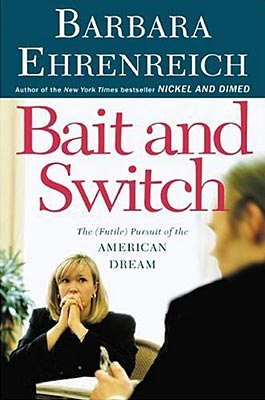
After casting her lot with the working poor in Nickel and Dimed, Barbara Ehrenreich plunges into another socioeconomic twilight zone: the world of superfluous white-collar workers. Changing her name and setting aside her aversion to cubicles, she tries to get a full-time job as a P.R. consultant. There’s just one big glitch: Getting hired—especially when you’re female, well over 40, and devoid of contacts—is not so easy. Bait and Switch turns out to be less about working 9 to 5 than about the surreal, exploitative subculture of career coaches, networking gurus, image consultants, and even Christian evangelists who seek to feed off the desperation of the middle-class jobless.
As in Nickel and Dimed, Ehrenreich is in this world but not really of it. Trained as a scientist, she has no patience with the imprecision of personality tests or the mumbo jumbo that passes for career advice. She finds herself proselytized, exhorted, critiqued, and coached but rarely helped. In one grimly funny passage, she even tries to run a con of her own by convincing a hapless career coach that he needs her to hone his image. (No dice; she still ends up forking over $175 for the “coaching” session.)
Ehrenreich is particularly acerbic and astute in her analysis of the cult of job seeking. She resents that the onus of unemployment is placed on the individual, as though a positive attitude alone can overcome the pressures of downsizing, outsourcing, and other global economic trends. Being Ehrenreich, she instead longs for rebellion, for the unemployed and underemployed to mount a push for better jobless benefits and guaranteed health insurance. But she knows that such a movement will require a transformation more profound than any career coach envisions, “from solitary desperation to collective action.”












